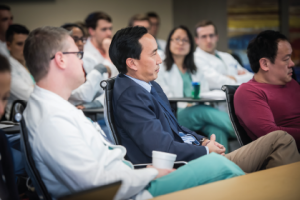
© University of Kansas Medical Center
Since its inception in 2006, ENTtoday has continued to grow in size and scope. Its circulation is among the highest in otolaryngology, and industry surveys show that our readers rate the newsmagazine as a leading otolaryngology publication for content and enjoyment. From the beginning, ENTtoday has been led by one physician editor-in-chief, Robert Miller, MD. Bob has left a true legacy within the field of otolaryngology, and we wish him well in his retirement. I am honored to have been chosen by the Triological Society to be the next physician editor-in-chief for
Explore This Issue
January 2018ENTtoday. We have built a new editorial board, and together we look forward to incorporating some new ideas into an already successful newsmagazine.
ENTtoday is unique. We are a newsmagazine, different from a journal in that our article ideas are often plucked from today’s news and trends. Freed from the responsibilities of peer review, we have a mission that is different from other otolaryngology publications. We are here not only to inform, but also to challenge, amuse, and entertain.
The way we inform continues to evolve. Technology influences every aspect of our lives and affects how we treat patients, educate learners, conduct business, and perform research. As we move forward, one of our goals is to embrace the power of technology. Infusion of multimedia, greater dedication to social media, and reorganization of our website are all part of the future of ENTtoday. This month, we have a story on lecture-free medical school curricula, made possible by the use of multimedia and buildings equipped with the latest communication and simulation technologies (“No Lecture Required,”).
The influence of social media has made timeliness of information critical to our readership. Day-to-day politics in our country affect us all and bring unique challenges to our roles as otolaryngologists. From the charged dialogue around the Affordable Care Act to the ethics of physician-assisted suicide and stem cell research, there are many important issues that hold specific implications for practicing otolaryngologists. We plan to discuss them in a balanced and transparent manner and will actively work to present diversity in our thoughts and opinions.

© University of Kansas Medical Center
It is with diversity that we can present the many sides to some of our most difficult challenges. The struggle for physician wellness and work–life balance is real, and rates of physician burnout are on the rise. An estimated 50% of practicing otolaryngologists exhibit some form of burnout that manifests as feelings of emotional exhaustion, depersonalization of patients, and/or decreased sense of personal accomplishment. I don’t think many of us could have imagined we would feel this way when we started our journeys as physicians. We think this is an issue critical to otolaryngology and to medicine as a whole, and we will renew our focus on articles that speak to physician wellness, professional development, and mentorship.